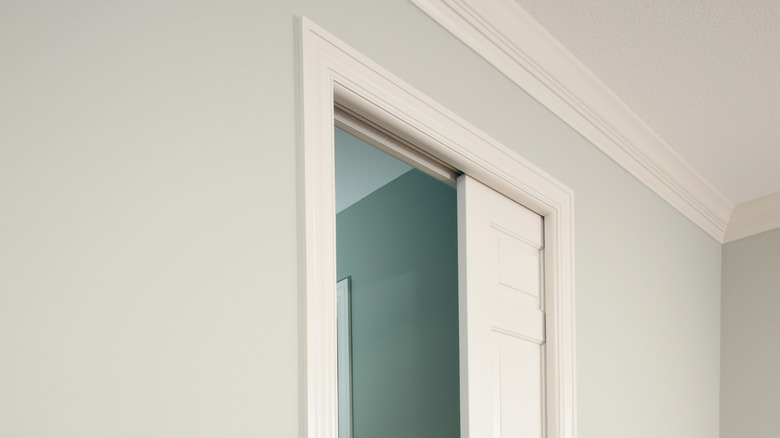How To DIY A Pocket Door To Help Create More Privacy In Your Home
Homeowners' needs around private spaces are gaining relevance due to remote work and differing family needs, leading many homeowners to avoid open floor plans wherever possible. Many families are looking for ways to transform once-open spaces into separate rooms for increased privacy. Especially where rooms connect via an opening larger than a traditional door, it can be difficult to identify the best options for closing off a space. For cases just like these, TikTok user @mydiyhaus has a nifty solution: a DIY pocket door.
A pocket door uses a sliding system: The door opens by slipping into a "pocket" in the wall. This solution maximizes space in both rooms by skipping the need for double doors or even a hinged door, while also supplying a sleek look. By using a framing kit, some drywall, and an old, recycled closet door, you can turn a wide-open thoroughfare into two private spaces. This DIY project is best suited for more experienced DIYers because it involves installing drywall, trimming a door frame, sanding down joint compound, and more. If you don't have an old door you can use, this project can also end up costing upwards of $300. For those with the materials and experience to take on an exciting, multi-room transformation, this project is particularly rewarding.
How add privacy with a pocket door
First, ensure that you're working with an ideal place in your home for a pocket door. Then, measure your space and determine whether a pocket door frame can satisfy your size requirements. This DIY project will only work well if you need to fill a space that is about two doors' length wide. You'll need to purchase drywall, joint compound, and mesh tape. Pick up a pocket door kit, like this 30 x 84-inch Pocket Door Frame from Home Depot for around $125. If you don't have an old closet door or access to recycled materials like this, you'll need to purchase that too. Prices on doors will depend on the size, but you can expect to pay upwards of $200 for something like this primed slab door from Lowe's.
Begin by trimming the pocket door kit to fit the dimensions of your wall's opening, if necessary. If your pocket door kit is slightly too narrow to fill the wall space, you can use 2x4s to bridge the gaps without losing integrity. Next, follow the instructions for the specific pocket door kit you've purchased, which should guide you on the correct placement for each piece. Add your closet door, then mount the drywall, holding it in place with mesh tape during the process. Fill in the seams with joint compound, then get to sanding. Once it's all smooth, paint the wall and the door with your desired color scheme.
